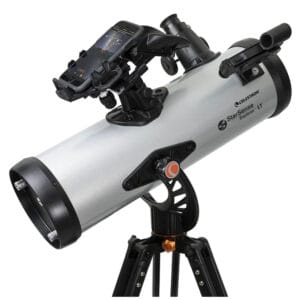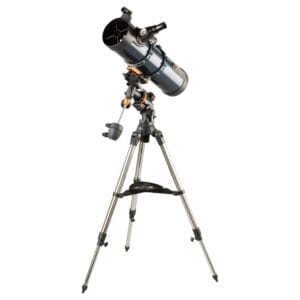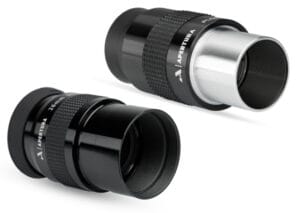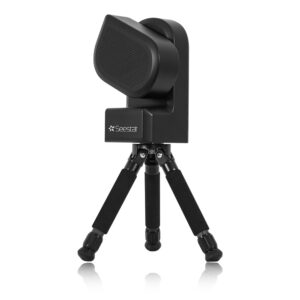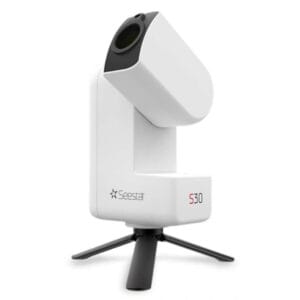The best telescopes for planets have a long focal length, sharp optics, and sufficient aperture to reveal details on Jupiter, Saturn, and Mars. In this blog, you’ll discover which type of telescope is most suitable for planetary observation, what to look for as a beginner, and which models offer the best value for money.
Why are some Telescopes Better for Planets?
Planets like Jupiter and Saturn are bright but relatively small in the sky. You therefore need a telescope that:
✓ Can handle high magnification (without blurry image)
✓ Provides high contrast to distinguish fine details (like rings or cloud bands)
✓ Is stable, so the image doesn’t shake at high magnification
That’s why telescopes with a long focal length and good optical quality are most suitable.
What’s Important for Planetary Observation?
1. Focal Length
The longer the focal length, the easier it is to achieve high magnification. A 1200mm telescope is therefore often better suited for planets than a 500mm one.
2. Aperture
The aperture determines how much light and detail you capture. For planetary observation, you want at least 90mm, but preferably 130mm or more.
3. Seeing
That’s the stability of the air. Even with the best telescope, you’ll see little if the atmosphere is unstable. Therefore, observations around midnight, with calm skies, are the best time.
4. Magnification and Eyepieces
A useful magnification is 1 to 2 times the aperture in mm. For a 150mm telescope, that means 150x to 300x. Use good eyepieces and optionally a Barlow lens.
Which Type of Telescope is Best for Planets?
| Type | Advantage | Suitable for planets? |
|---|---|---|
| Refractor | Very sharp image, no alignment needed | ✓ (at f/10 or higher) |
| Newtonian Reflector | Large aperture, high magnification possible | ✓✓ (especially f/6-f/8 models) |
| Maksutov-Cassegrain | Compact, long focal length | ✓✓✓ (but more expensive per mm) |
| Dobsonian | Large mirrors, affordable | ✓✓✓ (ideal from 150mm) |
For beginners and budget-conscious buyers, Dobsonian telescopes are by far the most recommended option.
Best Telescopes for Planets by Budget
Under €400 – Entry-Level with Power
- Sky-Watcher Dobsonian 150/1200
✓ Large mirror, long focal length, stable base.
✓ Perfect for the moon, Jupiter, and Saturn.
✓ Affordable without compromising image quality.
With Dobsonians, the rule is: buy the largest size your budget allows. The larger the mirror, the more details you’ll see.
Between €400 – €700, for those who Want a Bit More
- Sky-Watcher Dobsonian 200/1200
✓ 33% more light than the 150mm version
✓ More details on Jupiter, sharper rings of Saturn
✓ Excellent to combine with color filters and Barlow
€700 and up, Convenience and Performance Combined
- Celestron StarSense Explorer Dobsonian 200/1200
✓ Same optics as the above-mentioned 200mm Dobsonian
✓ Includes smartphone navigation with StarSense app
✓ Ideal for beginners who want help with targeting
Recommended: Sky-Watcher Dobsonian 150/1200 or 200/1200
The Sky-Watcher Dobsonian 150/1200 and 200/1200 are Newtonian reflectors on a simple, stable wooden Dobsonian mount. They offer:
✓ A long focal length (f/8): perfect for planetary observation
✓ Large aperture of 150 or 200mm: lots of light and detail
✓ Affordable price: great value for money
✓ Simple use: no complex electronics
With a good eyepiece (like a 6mm Plössl or LE Planetary Eyepiece) you can see:
- The cloud bands of Jupiter
- The rings of Saturn
- The polar caps of Mars
- Craters and shadows on the moon in razor-sharp contrast
These models are known as the ultimate starter option for those who want to seriously observe planets.
Check out the Sky-Watcher Dobsonian telescopes on Telescoop.nl for current prices and specifications.
Smart Upgrade: Celestron StarSense Explorer Dobsonian 200/1200
Want help finding planets in the sky? Then the Celestron StarSense Explorer Dobsonian 200/1200 is a smart choice. This telescope combines:
✓ Large 200mm mirror
✓ Long focal length (f/6)
✓ StarSense smartphone navigation: your phone helps you quickly find Saturn or Mars
✓ Sturdy Dobsonian base
Ideal for those with no experience in finding objects. The app shows you exactly where to point with arrows. Once you have Jupiter or Venus in view, you’ll see razor-sharp details thanks to Celestron’s optics.
This is the perfect model for families, beginning enthusiasts, or anyone who wants to see planets without the hassle of setup.
More info on the product page of the StarSense Dobsonian.
What Can You Expect to See?
With the right telescope you can see:
✓ Jupiter – cloud bands, Great Red Spot, 4 Galilean moons ✓ Saturn – rings, Cassini Division, moon Titan ✓ Mars – polar caps, dark spots during opposition ✓ Venus – moon-like phases ✓ Uranus & Neptune – as blue-green dots (with larger telescopes)
Note: planetary observation is detail work. The better the seeing and optics, the more you’ll see.
Tips for Even Better Results
✓ Let your telescope cool down outside for 30-60 minutes before starting
✓ Use color filters (e.g., blue for Jupiter, red for Mars) to increase contrast
✓ Combine with a good Barlow lens for more magnification
✓ Preferably observe when planets are high in the sky
Conclusion: the Best Telescopes for Planets
The best telescopes for planets are models with a long focal length, stable optics, and sufficient aperture. For those just starting or wanting quick results:
✔ Choose the Sky-Watcher Dobsonian 150/1200 for top quality without fuss
✔ Upgrade to the Celestron StarSense Dobsonian 200/1200 if you want help with targeting
Both models offer razor-sharp views of Jupiter, Saturn, and Mars, without complicated mounting or setup work.


